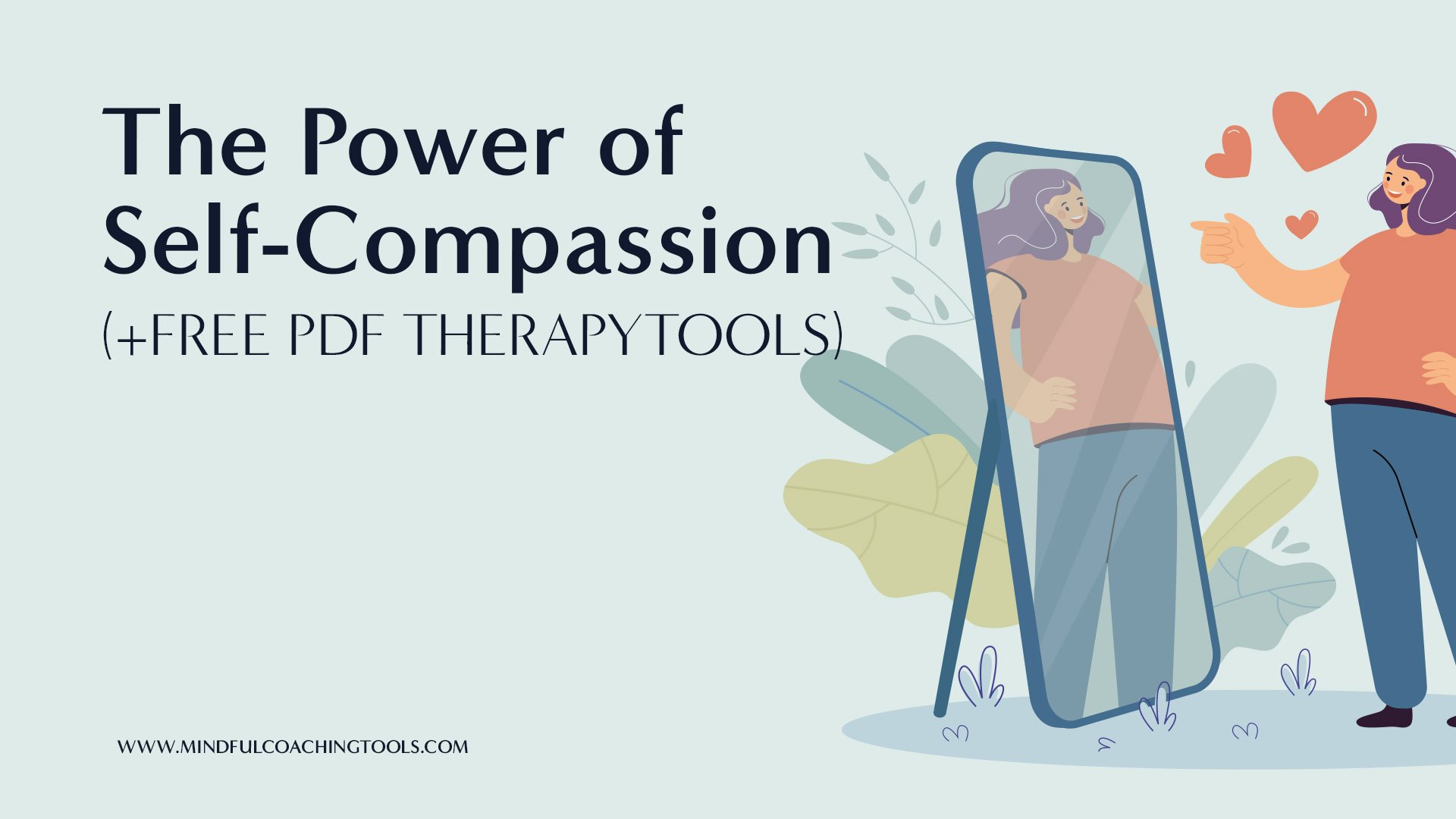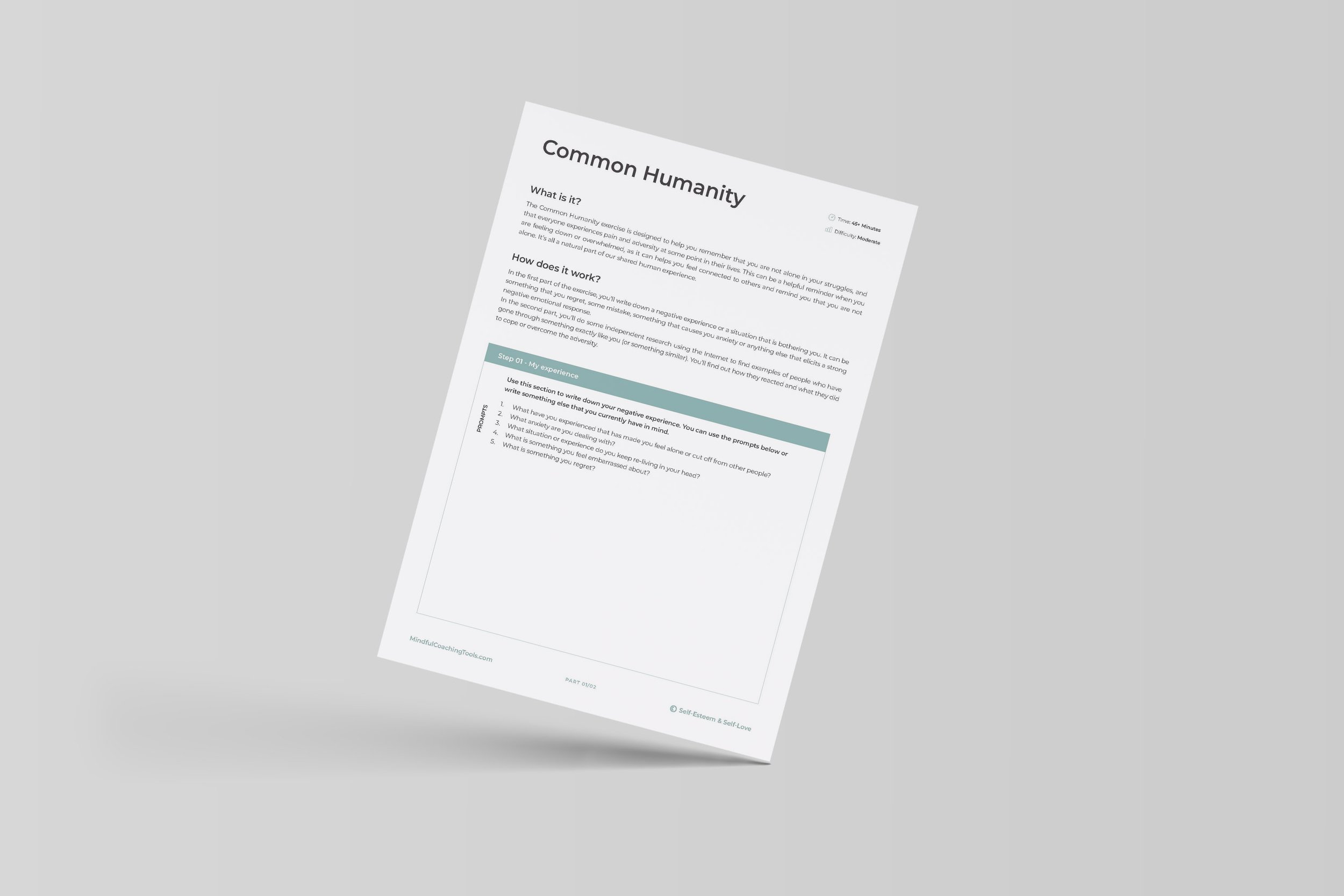The Power of Self-Compassion (+Free PDF Therapy Tools)
So often in our society, we are told to be hard on ourselves, to strive for perfection, and to never make mistakes. But what if there was a better way? What if instead of being hard on ourselves, we learned to be more understanding and forgiving? That's where self-compassion comes in.
Self-compassion is recognizing that we are all human and that everyone makes mistakes. It's about being understanding and forgiving when things go wrong. And it turns out that self-compassion can be one of the most important things we learn in life. When we have compassion for ourselves, we are more likely to have compassion for others. We also become more motivated to improve ourselves – not because we're trying to meet some unrealistic standard, but because we want to be the best that we can be.
How Self-Compassion Is Different From Self-Pity
Many people mistakenly believe that self-compassion is the same as self-pity. However, self-pity is characterized by a sense of self-righteousness and victimization, whereas self-compassion is characterized by a sense of understanding and kindness toward oneself. Self-compassion is a healthy way to cope with hardships because it allows us to acknowledge our pain without judgment or avoidance. Furthermore, research has shown that self-compassionate people are more resilient in the face of adversity and have higher levels of well-being overall.
Why Self-Compassion is Important
1. Self-compassion is important for a number of reasons. First, it helps us to cope with difficult emotions. When we are self-compassionate, we recognize that our emotions are normal and human. We don't try to push them away or ignore them – instead, we allow ourselves to feel them fully. As a result, we suffer less from anxiety, depression, and other mental health problems.
2. Second, self-compassion helps us to stay motivated. When we have self-compassion, we don't beat ourselves up for making mistakes or falling short of our goals. Instead, we see our setbacks as opportunities for growth and learning. This allows us to stay engaged and motivated even when things are tough.
3. Finally, self-compassion leads to greater happiness and well-being. People who are more self-compassionate tend to have greater life satisfaction and happiness than those who are not. They also tend to cope better with stress, setbacks, and failure. So if you're looking for a way to improve your life satisfaction and happiness, self-compassion might be the easiest way.
The three parts of self-compassion
Most people don't focus on what they have in common with others when they feel ashamed or inadequate. When we focus on our shortcomings without taking the bigger human picture into account, our perspective tends to narrow. The recognition of common humanity entailed by self-compassion also allows us to be more understanding and less judgmental about our inadequacies.
Self-compassion has three components: mindfulness, common humanity, and self-kindness. Let's take a closer look at each one.
Mindfulness
Self-compassion requires being mindful of our thoughts and feelings in order to respond to them in a kind and loving way. This means that we acknowledge our pain and suffering instead of numbing or ignoring it. We also accept that we are not perfect and that we will make mistakes. Mindfulness is an important part of self-compassion because it allows us to be present in the moment and to see things as they really are. It also allows us to be aware of our thoughts and feelings without judgment. By being mindful, we can learn to treat ourselves with kindness, patience, and understanding. We can also learn to forgive ourselves for our mistakes and shortcomings. By practicing mindfulness, we can develop self-compassion which will allow us to lead happier and more fulfilling lives.
Common Humanity
Finding common humanity is a key part of self-compassion. When we can see ourselves as part of the larger human experience, we can more easily have compassion for ourselves. We all struggle at times, and we all make mistakes. Recognizing that we are not alone in our struggles can help us to be more kind and understanding of ourselves. It can also lead to greater feelings of connectedness and a sense of belonging. When we feel like we belong, we are more likely to take care of ourselves and treat ourselves with respect. So finding common humanity is not only an act of self-compassion, but it also helps to create a foundation for self-care.
Self-Kindness
Self-kindness is an important part of self-compassion. It involves being understanding and supportive of yourself, especially during difficult times. When you are self-kind, you give yourself the same care and compassion that you would give to a friend. This can be a powerful way to stay motivated because it helps you to see yourself in a positive light and to believe in your own ability to overcome challenges. Additionally, self-kindness can help to reduce stress and anxiety, as well as improve your overall mood
How to practice self-compassion? (+Free PDF Therapy Tools)
1. Finding your common humanity
One of the best places to start when starting your self-compassion practice is to focus on the experiences you share with other people. For that purpose, we've created "The Common Humanity Exercise" which is designed to help you remember that you are not alone in your struggles and that everyone experiences pain and adversity at some point in their lives. This can be a helpful reminder when you are feeling down or overwhelmed, as it can helps you feel connected to others and remind you that you are not alone. It’s all a natural part of our shared human experience.
2. Treat yourself, like you would treat a friend
We've all been there before - berating ourselves for a mistake at work, beating ourselves up over a failed relationship, or feeling like we're just not good enough. For many of us, it's easy to be our
own worst critic. We dwell on our flaws and shortcomings, and we're quick to point out areas
where we need to improve. But when it comes to our friends, we're much more forgiving. We see
their mistakes as part of their journey, we accept them for who they are, and we offer them compassion and understanding.
This exercise will help you identify how you’re capable of being compassionate and how you could treat yourself with a more forgiving attitude.
3. Accepting yourself
You probably already know this but mistakes and setbacks are part of the human condition. Sometimes getting a little reminder can be of great help! We've created an exercise that is based on the work of Dr. Kristin Neff from https://self-compassion.org and it is designed to help you remind yourself that making mistakes is okay and all part of the process. Instead of criticizing yourself for your past mistakes and/or weaknesses, it’s more productive to acknowledge them and approach yourself with more kindness.
More helpful resources about self-compassion
Here are 3 must read free resources on self-compassion:
The Many Benefits of Self-Compassion - https://www.psychalive.org/many-benefits-of-self-compassion/
Self-Compassion Guided Practices by Dr. Kristin Neff - https://self-compassion.org/category/exercises/
Download Free Self-Esteem Worksheets from - https://www.therapistaid.com/therapy-worksheets/self-esteem/





